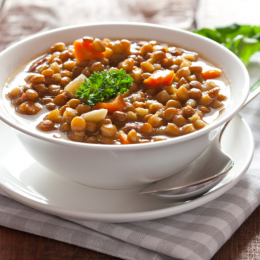4 Healthy Food Swaps That Actually Aren’t
Don’t waste your time (or calories) on these health food imposters.

An overall healthy diet allows for the occasional indulgence. It not only promotes a healthier relationship with food, but studies have found that people who let themselves cheat on their overall healthy diet once in a while are more likely to achieve their weight loss goals.
So have the cookie for Sunday dessert, or enjoy every bite of cake at your grandson’s wedding. As long as you eat clean the majority of the time, you can still maintain a healthy weight or even lose extra pounds.
The tricky part: Eating clean isn’t as simple as avoiding cookies, cakes, and other obvious junk. Some so-called health foods that you might be filling up on between occasional treats are really no better for you—and may even have more sugar and calories.
Here are four seemingly smart food swaps you might be making that can come back to bite you—and what to eat instead.
Get and stay fit with SilverSneakers! Choose from dozens of different Community classes, visit a participating fitness location, or view the current schedule of SilverSneakers LIVE online classes.
Unhealthy Food Swap #1: Granola Instead of Sugary Cereal
Tasty, crunchy granola may be a staple in the health food aisle at any grocery store, but it’s way too easy to overeat, says Tracy Lockwood Beckerman, R.D., owner of Tracy Lockwood Beckerman Nutrition. Most people gobble up much more than the recommended serving size of ¼ to ⅓ cup. That makes it easy to pile on more than 300 calories just by having an extra couple handfuls.
Beyond calories, you could easily down more than twice as much sugar as you’d get from a pastry. A regular Krispy Kreme Original Glazed Doughnut has 10 grams of sugar. One cup of Nature Valley Oats ’n Honey Protein Granola has 24 grams of sugar. And the same amount of Nature Valley Peanut Butter ’n Dark Chocolate Protein Granola has 30 grams of sugar.
Eat this: You don’t have to avoid granola entirely, but choose smartly and control your portions.
“Check the label to make sure the sugar content is reasonable—less than 10 grams per serving ideally,” Lockwood Beckerman suggests.
One solid option: Bear Naked V’nilla Almond Fit Granola, which clocks in at 110 calories and just three grams of sugar per ¼-cup serving, or 210 calories and seven grams of sugar per ½-cup serving. Just be sure to grab that measuring cup so you’re pouring out a single serving.
Unhealthy Food Swap #2: Veggie Chips Instead of Potato Chips
Pretty bags and labels like “all natural” and “made with real vegetables” are designed to catch your eye, but many veggie chips have no nutritional value.
“They might be manufactured to have the same color as real vegetables, but most contain only a trace of real veggies and usually have just as much sodium and fat as a traditional chip,” says Lauren Manaker, R.D.N., founder of Nutrition Now.
Eat this: If you absolutely love veggie chips, go with kale, which are usually made by baking instead of frying the leaves. Kale chips are a great choice on a road trip, for example, because they’re low in calories and loaded with fiber.
An even better option? Reach for bean- or quinoa-based chips, says Manaker, because they contain loads of fiber, protein, vitamins, and minerals.
Unhealthy Food Swap #3: Reduced-Fat Peanut Butter Instead of Full-Fat Peanut Butter
Reduced fat often means increased sugar. And labels like “all natural” and “healthy” don’t necessarily mean a nut butter is an exception to this rule.
“Although peanut butter is high in fat, the fat it contains is heart-healthy monounsaturated fat,” Lockwood Beckerman explains. When companies process peanut butter into the low-fat version, they end up increasing the sugar content, so even though it’s lower in fat, it likely contains more sugar, she says.
Eat this: Look for an all-natural peanut butter with peanuts and maybe salt as the only ingredients listed on the nutrition label, Lockwood Beckerman says.
Subscribe to our newsletter
It's quick and easy. You could be one of the 13 million people who are eligible.
Already a member? Click to discover our 15,000+ participating locations.
Follow Us
Unhealthy Food Swap #4: A Smoothie Instead of a Meal
They’re easy to sip on the go and seem like the perfect way to refuel after a workout, but juice bars and smoothie shops sneak in a lot of sugar, Lockwood Beckerman says. Yes, the sugar is natural and from the fruit itself, but you’re probably getting more than you need.
Some smoothie bars use six servings of fruit to make a single 12-ounce smoothie. This can send our blood glucose levels skyrocketing and negatively impact our blood vessels in the long run, Lockwood Beckerman says.
What’s more, the most convenient options—prepackaged smoothies—may be the worst offenders. For example, one Naked Juice Blue Machine Smoothie packs a whopping 55 grams of sugar. That’s a huge hit of sweetness. Would you ever eat more than three medium apples in one sitting? Probably not, but that’s what you’ll slurp down in this bottle.
Drink this: You can make more well-rounded smoothies at home, Lockwood Beckerman says.
Her winning formula: Start with 1½ to 2 cups of fresh or frozen vegetables, such as kale, spinach, carrots, or beets. Add in a natural protein source, such as 2 tablespoons of nuts, seeds, nut butter, or flaxseed. Next, mix in 1 cup of fresh or frozen fruit, like mixed berries or peaches. Blend with water or unsweetened almond milk.
For more simple recipes, check out our guide to six high-protein smoothies that don’t taste like chalk.
Take Your Favorite SilverSneakers Classes Online!
SilverSneakers members can access live fitness classes and wellness workshops through SilverSneakers LIVE. See the latest schedule and RSVP for classes here.
Not a member? If you have a Medicare Plan, it may include SilverSneakers—at no additional cost. Check your eligibility instantly here.




